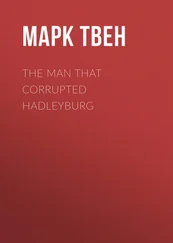Mark Twain - The Man That Corrupted Hadleyburg and Other Stories
Здесь есть возможность читать онлайн «Mark Twain - The Man That Corrupted Hadleyburg and Other Stories» весь текст электронной книги совершенно бесплатно (целиком полную версию без сокращений). В некоторых случаях можно слушать аудио, скачать через торрент в формате fb2 и присутствует краткое содержание. Год выпуска: 2004, Жанр: Классическая проза, Юмористическая проза, на английском языке. Описание произведения, (предисловие) а так же отзывы посетителей доступны на портале библиотеки ЛибКат.
- Название:The Man That Corrupted Hadleyburg and Other Stories
- Автор:
- Жанр:
- Год:2004
- ISBN:нет данных
- Рейтинг книги:4 / 5. Голосов: 1
-
Избранное:Добавить в избранное
- Отзывы:
-
Ваша оценка:
- 80
- 1
- 2
- 3
- 4
- 5
The Man That Corrupted Hadleyburg and Other Stories: краткое содержание, описание и аннотация
Предлагаем к чтению аннотацию, описание, краткое содержание или предисловие (зависит от того, что написал сам автор книги «The Man That Corrupted Hadleyburg and Other Stories»). Если вы не нашли необходимую информацию о книге — напишите в комментариях, мы постараемся отыскать её.
The Man That Corrupted Hadleyburg and Other Stories — читать онлайн бесплатно полную книгу (весь текст) целиком
Ниже представлен текст книги, разбитый по страницам. Система сохранения места последней прочитанной страницы, позволяет с удобством читать онлайн бесплатно книгу «The Man That Corrupted Hadleyburg and Other Stories», без необходимости каждый раз заново искать на чём Вы остановились. Поставьте закладку, и сможете в любой момент перейти на страницу, на которой закончили чтение.
Интервал:
Закладка:
The ladies in the gallery were learning. That was well; for by-and-by ladies will form a part of the membership of all the legislatures in the world; as soon as they can prove competency they will be admitted. At present, men only are competent to legislate; therefore they look down upon women, and would feel degraded if they had to have them for colleagues in their high calling.
Wolf is yelling another market report now.
Gessman. 'Shut up, infamous louse-brat!'
During a momentary lull Dr. Lueger gets a hearing for three sentences of his speech. The demand and require that the President shall suppress the four noisiest members of the Opposition.
Wolf (with a that-settles-it toss of the head). 'The shifty trickster of Vienna has spoken!'
Iro belonged to Schonerer's party. The word-of-honour incident has given it a new name. Gregorig is a Christian Socialist, and hero of the post-cards and the Wimberger soda-squirting incident. He stands vast and conspicuous, and conceited and self-satisfied, and roosterish and inconsequential, at Lueger's elbow, and is proud and cocky to be in such a great company. He looks very well indeed; really majestic, and aware of it. He crows out his little empty remark, now and then, and looks as pleased as if he had been delivered of the Ausgleich. Indeed, he does look notably fine. He wears almost the only dress vest on the floor; it exposes a continental spread of white shirt-front; his hands are posed at ease in the lips of his trousers pockets; his head is tilted back complacently; he is attitudinising; he is playing to the gallery. However, they are all doing that. It is curious to see. Men who only vote, and can't make speeches, and don't know how to invent witty ejaculations, wander about the vacated parts of the floor, and stop in a good place and strike attitudes—attitudes suggestive of weighty thought, mostly—and glance furtively up at the galleries to see how it works; or a couple will come together and shake hands in an artificial way, and laugh a gay manufactured laugh, and do some constrained and self-conscious attitudinising; and they steal glances at the galleries to see if they are getting notice. It is like a scene on the stage—by-play by minor actors at the back while the stars do the great work at the front. Even Count Badeni attitudinises for a moment; strikes a reflective Napoleonic attitude of fine picturesqueness—but soon thinks better of it and desists. There are two who do not attitudinise—poor harried and insulted President Abrahamowicz, who seems wholly miserable, and can find no way to put in the dreary time but by swinging his bell and discharging occasional remarks which nobody can hear; and a resigned and patient priest, who sits lonely in a great vacancy on Majority territory and munches an apple.
Schonerer uplifts his fog-horn of a voice and shakes the roof with an insult discharged at the Majority.
Dr. Lueger. 'The Honourless Party would better keep still here!'
Gregorig (the echo, swelling out his shirt-front). 'Yes, keep quiet, pimp!'
Schonerer (to Lueger). 'Political mountebank!'
Prochazka (to Schonerer). 'Drunken clown!'
During the final hour of the sitting many happy phrases were distributed through the proceedings. Among them were these—and they are strikingly good ones:
'Blatherskite!'
'Blackguard!'
'Scoundrel!'
'Brothel-daddy!'
This last was the contribution of Dr. Gessman, and gave great satisfaction. And deservedly. It seems to me that it was one of the most sparkling things that was said during the whole evening.
At half-past two in the morning the House adjourned. The victory was with the Opposition. No; not quite that. The effective part of it was snatched away from them by an unlawful exercise of Presidential force—another contribution toward driving the mistreated Minority out of their minds.
At other sittings of the parliament, gentlemen of the Opposition, shaking their fists toward the President, addressed him as 'Polish Dog'. At one sitting an angry deputy turned upon a colleague and shouted, '—————!'
You must try to imagine what it was. If I should offer it even in the original it would probably not get by the editor's blue pencil; to offer a translation would be to waste my ink, of course. This remark was frankly printed in its entirety by one of the Vienna dailies, but the others disguised the toughest half of it with stars.
If the reader will go back over this chapter and gather its array of extraordinary epithets into a bunch and examine them, he will marvel at two things: how this convention of gentlemen could consent to use such gross terms; and why the users were allowed to get out the place alive. There is no way to understand this strange situation. If every man in the House were a professional blackguard, and had his home in a sailor boarding-house, one could still not understand it; for, although that sort do use such terms, they never take them. These men are not professional blackguards; they are mainly gentlemen, and educated; yet they use the terms, and take them too. They really seem to attach no consequence to them. One cannot say that they act like schoolboys; for that is only almost true, not entirely. Schoolboys blackguard each other fiercely, and by the hour, and one would think that nothing would ever come of it but noise; but that would be a mistake. Up to a certain limit the result would be noise only, but, that limit overstepped, trouble would follow right away. There are certain phrases—phrases of a peculiar character—phrases of the nature of that reference to Schonerer's grandmother, for instance—which not even the most spiritless schoolboy in the English-speaking world would allow to pass unavenged. One difference between schoolboys and the law-makers of the Reichsrath seems to be that the law-makers have no limit, no danger-line. Apparently they may call each other what they please, and go home unmutilated.
Now, in fact, they did have a scuffle on two occasions, but it was not on account of names called. There has been no scuffle where that was the cause.
It is not to be inferred that the House lacks a sense of honour because it lacks delicacy. That would be an error. Iro was caught in a lie, and it profoundly disgraced him. The House cut him, turned its back upon him. He resigned his seat; otherwise he would have been expelled. But it was lenient with Gregorig, who had called Iro a cowardly blatherskite in debate. It merely went through the form of mildly censuring him. That did not trouble Gregorig.
The Viennese say of themselves that they are an easy-going, pleasure-loving community, making the best of life, and not taking it very seriously. Nevertheless, they are grieved about the ways of their Parliament, and say quite frankly that they are ashamed. They claim that the low condition of the parliament's manners is new, not old. A gentleman who was at the head of the government twenty years ago confirms this, and says that in his time the parliament was orderly and well-behaved. An English gentleman of long residence here endorses this, and says that a low order of politicians originated the present forms of questionable speech on the stump some years ago, and imported them into the parliament.(2) However, some day there will be a Minister of Etiquette and a sergeant-at-arms, and then things will go better. I mean if parliament and the Constitution survive the present storm.
IV.—THE HISTORIC CLIMAX
During the whole of November things went from bad to worse. The all-important Ausgleich remained hard aground, and could not be sparred off. Badeni's government could not withdraw the Language Ordinance and keep its majority, and the Opposition could not be placated on easier terms. One night, while the customary pandemonium was crashing and thundering along at its best, a fight broke out. It was a surging, struggling, shoulder-to-shoulder scramble. A great many blows were struck. Twice Schonerer lifted one of the heavy ministerial fauteuils—some say with one hand—and threatened members of the Majority with it, but it was wrenched away from him; a member hammered Wolf over the head with the President's bell, and another member choked him; a professor was flung down and belaboured with fists and choked; he held up an open penknife as a defence against the blows; it was snatched from him and flung to a distance; it hit a peaceful Christian Socialist who wasn't doing anything, and brought blood from his hand. This was the only blood drawn. The men who got hammered and choked looked sound and well next day. The fists and the bell were not properly handled, or better results would have been apparent. I am quite sure that the fighters were not in earnest.
Читать дальшеИнтервал:
Закладка:
Похожие книги на «The Man That Corrupted Hadleyburg and Other Stories»
Представляем Вашему вниманию похожие книги на «The Man That Corrupted Hadleyburg and Other Stories» списком для выбора. Мы отобрали схожую по названию и смыслу литературу в надежде предоставить читателям больше вариантов отыскать новые, интересные, ещё непрочитанные произведения.
Обсуждение, отзывы о книге «The Man That Corrupted Hadleyburg and Other Stories» и просто собственные мнения читателей. Оставьте ваши комментарии, напишите, что Вы думаете о произведении, его смысле или главных героях. Укажите что конкретно понравилось, а что нет, и почему Вы так считаете.










